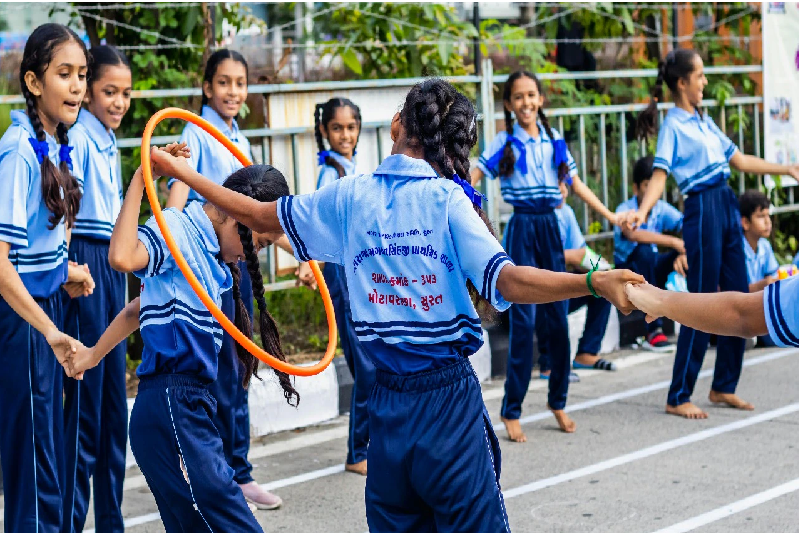
Delhi Schools to Launch Mandatory Student Clubs for Language, Arts, and Sports in 2025-26
To encourage holistic development among students, the Delhi government has introduced a new initiative to establish student clubs in 100 government schools during the 2025-26 academic session. The Directorate of Education (DoE) has issued a circular detailing the program's framework, objectives, and guidelines, which aims to foster skills beyond the conventional classroom curriculum.
A Step Towards All-Round Development
Recognizing that education is not limited to academics alone, the DoE has emphasized the need for structured activities that promote creativity, critical thinking, communication, and leadership among students. Introducing student clubs is part of this larger vision to help learners discover their interests and talents while engaging in meaningful peer learning experiences.
According to the official circular, every participating school will establish two clubs:
- There is one language-based club, where students can choose to focus on Hindi, English, Sanskrit, Urdu, or Punjabi.
- One co-curricular club is selected from categories such as science, mathematics, sports and yoga, visual arts, performing arts (music and dance), Samarth (inclusive education), or a student council.
These clubs are intended to provide a platform for students to explore new areas of learning, develop practical skills, and express their creativity, contributing to their overall personality development.
Mandatory Participation for Students
The DoE has made it mandatory for every student to be a member of at least one club. This ensures that all children, regardless of academic performance, are exposed to extracurricular activities and collaborative learning environments.
The initiative is expected to help students:
- Develop communication and language skills through dedicated language clubs.
- Nurture interests in science, mathematics, or the arts through hands-on activities.
- Build confidence and leadership qualities through student council programs.
- Enhance physical and mental well-being via sports and yoga clubs.
- Foster inclusivity and empathy through Samarth clubs focused on special education awareness.
Role of School Heads in Implementation
The circular instructs heads of schools to oversee the smooth execution of club activities. Principals are expected to:
- Select suitable faculty members or mentors to guide each club.
- Schedule regular club meetings within school hours.
- Ensure every student is enrolled in at least one club based on preference.
- Provide resources and facilities required for club activities.
The initiative emphasizes structured planning and monitoring to avoid the common pitfalls of irregular extracurricular programs. Schools have been tasked with maintaining proper records of participation, outcomes, and student progress through these clubs.
Why the Initiative Matters
The Delhi government’s decision to introduce student clubs comes when educators and policymakers increasingly acknowledge the importance of 21st-century skills such as problem-solving, collaboration, creativity, and empathy. Academic learning alone cannot equip students with the adaptability and social skills needed in a rapidly evolving world.
Experts believe this step could:
- Encourage active student engagement in non-academic pursuits.
- Offer equal opportunities to children who may not excel in traditional classroom learning but show talent in arts, sports, or leadership roles.
- Help build a sense of community and teamwork among students from diverse backgrounds.
- Promote multilingual and multicultural exposure through language clubs, strengthening communication skills.
By integrating these clubs into the formal structure of schooling, the government aims to move beyond occasional competitions or hobby classes and provide consistent, guided development opportunities for all students.
Focus Areas of the Clubs
The program identifies specific areas to be prioritized for setting up clubs:
- Language Development – Enhancing proficiency in regional and national languages, fostering storytelling, creative writing, debate, and public speaking.
- STEM and Innovation – Providing a platform for science and mathematics enthusiasts to engage in experiments, problem-solving, and project-based learning.
- Sports and Yoga – Encouraging physical fitness, discipline, and mental well-being through structured sports activities and yoga sessions.
- Visual and Performing Arts – Nurturing talents in painting, theatre, music, dance, and other creative expressions.
- Inclusive Education (Samarth) – Promoting understanding and support for children with special needs, fostering empathy and inclusion.
- Leadership and Governance (Student Council) – Offering students hands-on experience in decision-making, teamwork, and democratic values within the school setting.
Expected Outcomes
With this initiative, the Delhi government aims to:
- Integrate extracurricular activities as an essential component of school education.
- Provide platforms for skill development that complement academic learning.
- Identify and nurture future leaders, artists, scientists, and sports personalities early.
- Improve student engagement, attendance, and overall school environment through activity-based learning.
If successfully implemented, the initiative could set a precedent for other states, making student clubs a mandatory part of India’s school education system.
Moving Forward
The 2025-26 academic session will serve as a pilot phase for this initiative across 100 schools. The government is expected to monitor the impact closely and make necessary improvements before expanding it to all government schools in Delhi.
With structured clubs becoming a compulsory part of school life, students will have more opportunities to discover their passions, enhance their skills, and gain exposure to diverse fields. This will prepare them not just for exams but for life beyond school walls.



